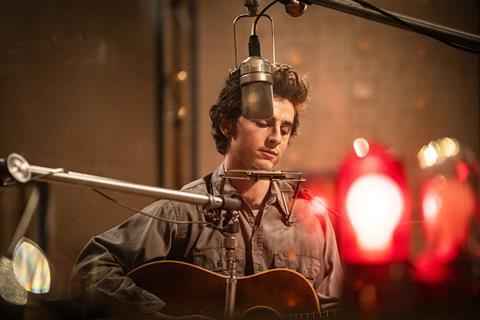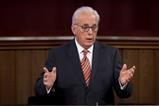A Complete Unknown is a film for anyone curious about the human condition. But by leaving out the singer’s conversion to Christianity, the redemptive arc is ultimately unfulfilling, says Krish Kandiah

I thought I knew about Bob Dylan. Then I watched his biopic. At the end of it, I knew even less.
A Complete Unknown is a film about the young Bob Dylan, played by Timothée Chalamet. For those familiar with Chalamet’s previous roles in Dune, Wonka and Call Me By Your Name, he may seem an unlikely choice of actor for the scruffy, grungy folk icon who redefined music in the 1960s.
I, too, had reservations - Chalamet’s youthful, almost baby-faced charm didn’t seem to align with the raw, rebellious energy that Dylan embodied. However, I was wrong. Chalamet’s portrayal is surprisingly fitting - perhaps because both were early breakouts in their respective fields and knew how to draw crowds and attention. As I watched the film, it turned out I was wrong about a lot of other things, too, when it came to Bob Dylan.
His conversion to Christianity redefined his relationship with his music, his identity and his audience
The film spans a crucial period of Dylan’s life - from his arrival in New York aged just 19, huddled in the back of a car with his notebook, to the electrifying moment at the Newport Folk Festival in 1965 when he made his bold switch from acoustic to electric guitar. That switch would change the course of music history, but the film looks beyond that transformation to another - Dylan’s evolving and elusive identity. It explores the loneliness behind the legend, the conflict behind the creativity, and the brokenness behind the brilliance.
Fame at what cost?
One of the most striking themes in A Complete Unknown is the loneliness that haunts Bob Dylan. He arrives in New York with no real personal connections - his family is never mentioned, and his background remains a mystery. As the film progresses, it becomes evident that this absence of connection defines him.
Dylan’s relationships - from that with his mentor Pete Seeger to his love interests - are all fleeting. At the end of the film, he rides off on his motorbike, alone, having seemingly pushed away every person who tried to get close.
In one of his later songs, ‘Marchin’ to the city’, Dylan sings: “Loneliness got a mind of its own / The more people around, the more you feel alone.”
This is a sentiment the film poignantly portrays. Despite his fame, the singer remains isolated, unable to trust anyone. He’s caught between public adoration and personal despair; between the spotlight and solitude. The more the world celebrates him, the more detached he becomes.
His early idealism - represented in a touching scene where he sings ‘Song for Woody’ to his idol Woody Guthrie while he is recovering in a psychiatric hospital in New Jersey - collapses under the weight of his great success.
Gift or curse?
At just 24, Dylan had already penned the iconic hits ‘Blowin’ in the wind’, ‘A hard rain’s a-gonna fall’, and ‘The times they are a-changin’, songs that spoke to the soul of a generation, and that still resonate today.
Dylan describes his songwriting process as quite otherworldly, saying: “Everyone’s asking me where these songs come from, but what they really want to know is why these songs haven’t come to them.”
This transcendence is a key theme. Dylan seems almost possessed by creating music. At one point, he’s shown strumming his guitar in the middle of the night, unable to stop writing, with the singer Joan Baez, his current love interest, indignant that he cares more about the music than their relationship.
This urge to create will propel him to global fame, but by taking precedence over everything else, will also leave him alienated and alone.
Who is Bob Dylan?
Despite being one of the most famous musicians of all time, Dylan remains an enigma. At the start of the film, we know little about him, and by the end, we know barely any more. We never fully understand the inner workings of his mind, the motivations behind his decisions or why he behaves as he does.
His family is absent, and his personal life is a series of self-sabotaged, broken relationships. This unresolved sense of the man behind the musician confronts us with the question at the heart of Bob Dylan’s most iconic song: “How does it feel / To be on your own / With no direction home / A complete unknown / Like a rolling stone?”
This lyric, which gives the film its title, speaks a truer word than the singer could have imagined.
An unfinished story
The film ends with Dylan aged just 24, at the peak of both his creative and personal struggles, deeply unfulfilled despite standing on the brink of unimaginable fame.
Yet his story is far from over. Perhaps the film’s greatest omission is Dylan’s later spiritual awakening, marked by his 1979 album Slow Train Coming, with songs like ‘Gotta serve somebody’ reflecting his newfound faith.
His conversion to Christianity redefined his relationship with his music, his identity and his audience. Including this chapter might have offered the redemptive arc that the film so intriguingly teases but, ultimately, lacks.
Despite being one of the most famous musicians of all time, Dylan remains an enigma
This is not the first biopic to suggest that art can transcend the artist, however this one invites us to experience something of that transcendence firsthand. Bob Dylan is an imperfect vessel through which something extraordinary flowed, resonating out across generations.
His songs tap into something deeper, wider and higher than himself. His lyrics, which have earned him a nobel prize for literature as well as countless other awards, invite us to grapple with the mess of the world, the mystery of creativity and the meaning of life, love and beauty.
I recommend A Complete Unknown. It is not just a film for Dylan fans or music lovers but for anyone curious about the human condition – it’s fundamental flaws, potential for greatness and relentless yearning. It will leave you pondering these things – as well as humming the songs - long after the credits roll.
A Complete Unknown will be showing in UK cinemas from January 2025






































1 Reader's comment